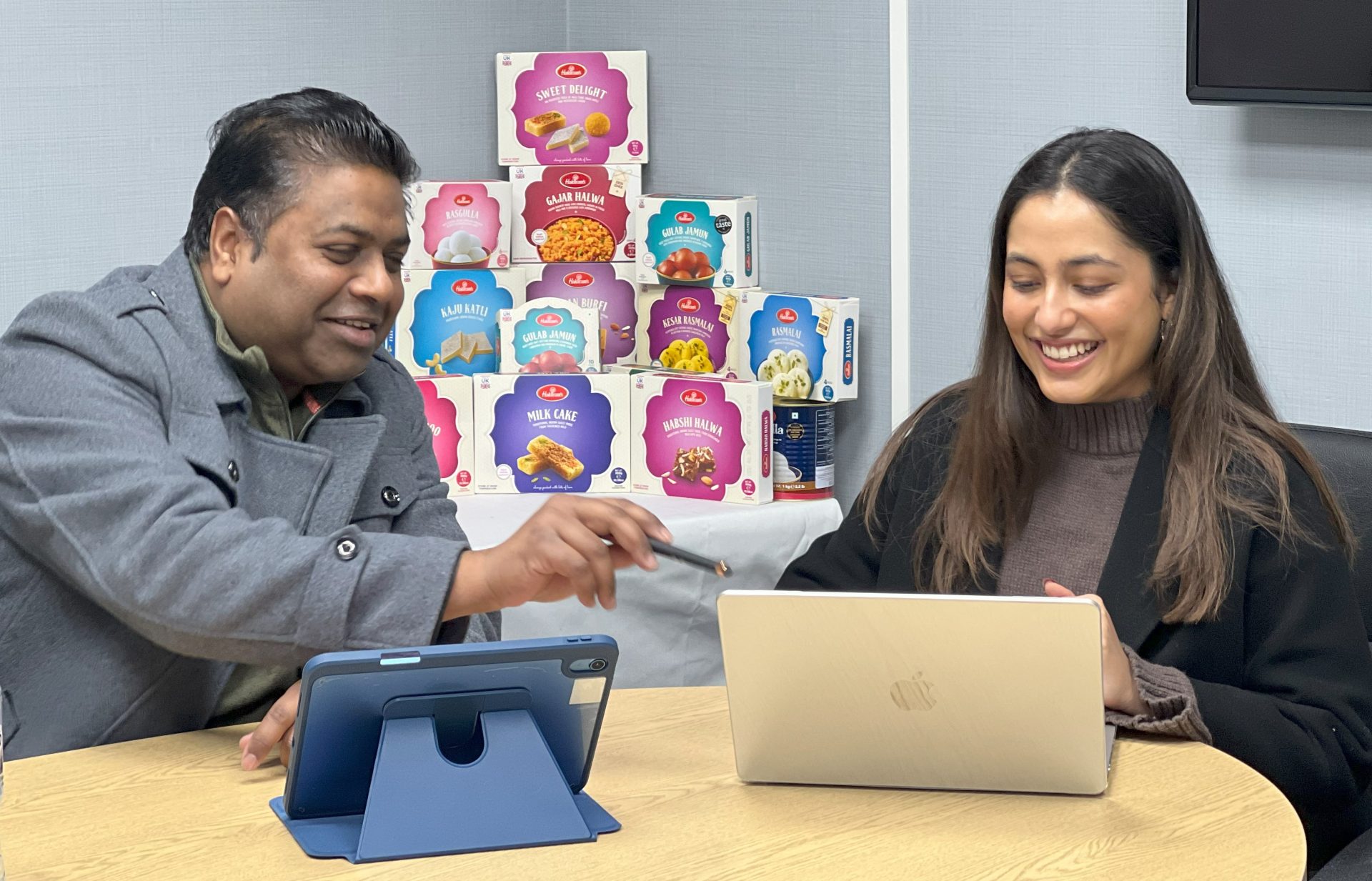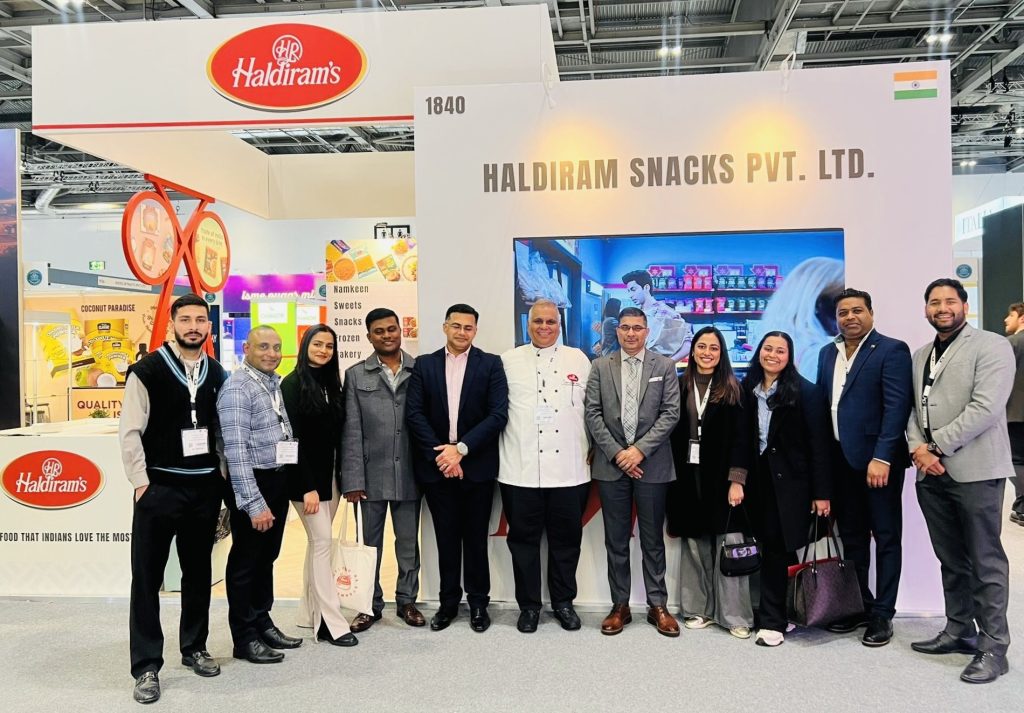Eight years ago, Haldiram’s, opened a manufacturing site in Southall, London, in response to restrictions on dairy exports to the UK and Europe. Now, UK expansion for India’s biggest snack brand is underway again as it has opened its doors to The Manufacturer to see first-hand how a small branch of a global enterprise operates.
Entering the Haldiram’s unit on an industrial site in Southall, there is much more than first meets the eye. As India’s largest snack brand, the company is sure to be found in every home across the country, but the growing UK market, it is currently found in more specialist stores, convenience shops and in major retailers such as Sainsbury’s and Morrisons during certain holiday seasons such as Diwali and Ramadan.
Key takeaways
- Haldiram’s opened its first UK manufacturing site in Southall in 2018 to overcome dairy export restrictions and post-Brexit challenges.
- Rhea Agarwal, a third-generation member of the founding family, now leads UK and EU business development.
- While core recipes remain traditional, product formats, packaging and ingredients are being investigated to suit UK consumer trends like convenience, health consciousness and reduced sugar intake.
- Haldiram’s uses a hybrid approach in manufacturing, combining automation with handcrafted methods (like hand-rolled sweets) to preserve authenticity and quality.
- The UK factory sources ingredients like milk from local farmers, employs a largely female workforce and plans to introduce new products like paneer and chilled snacks. A London-based Haldiram’s restaurant is also planned by the end of 2025.
FAQs
- When and where was Haldiram’s founded?
- How did Haldiram’s begin its international expansion?
- What are the main product lines offered by Haldiram’s?
- Why was Southall chosen as the location for Haldiram’s UK manufacturing site?
The company was founded in 1937 and began in a small town called Bikaner in Rajasthan. “My great grandfather started the business by himself and made savouries that he sold locally. It wasn’t until his son, my grandfather, took the business to Delhi that it started to expand”, said Rhea Agarwal, Director of Business Development UK and EU at Haldiram’s Overseas.
Haldiram’s consider Rhea’s grandfather to be the first generation of the family business, making Rhea a third-generation member of the operation. “He was the person to begin the expansion of the company and take it to the metropolitan cities of India”, she said.
By the 1990s the business began exporting goods overseas with the US being the first to receive these sweet treats in 1993 due to the demand from its large Indian population. The company now exports to over 108 countries worldwide, ensuring everyone has access to its extensive product line, full of traditional, family favourite flavours.
Over the years the business has expanded to produce many products such as frozen food, ready meals and instant foods. It established its first overseas factory in the UK in 2018. Haldiram’s also has its own chain of over 300 restaurants where its food is sold and served across India and in February, opened its first international store and restaurant in Dubai.
Gen Z leader
Rhea joined the business four years ago, firstly part-time to help during the COVID-19 pandemic when her family could not travel from India to support operations. Now she has finished her studies and has joined the company full-time as the UK and EU’s Director of Business Development. “My role is to find more business opportunities where we can grow. Although the position we’re in currently is great, there is no drive in just continuing what we have done for years – we need to move forward. Haldiram’s never had anyone on the ground in the UK and we have so much room to grow here”, she said.
Although a granddaughter of Haldiram’s founder, joining in the family business was not initially on the cards for Rhea. “It was never a given that I would work at Haldiram’s full-time, but I’ve always been extremely passionate about food.
As a child I would always hang out in the kitchen and I Iove the idea of serving someone a meal – it feels like a way to care for them”, she said. As a child, Rhea was actually unaware of what the family business actually involved, but she believes the passion for food was in her blood. “Aside from my family sharing mealtimes together, I was never influenced by anything else. I found enjoyment in feeding people and them enjoying the food – it made me want to do that in my work.”
Having time on her hands during COVID, she offered a helping hand to those who were still working on-site. She began by creating invoices prior to expanding into other areas. “I found myself in a position where I had to decide where I wanted to work; it was a no-brainer as I already had experience within manufacturing”, said Rhea.
Manufacturing does come with its challenges, and it isn’t always glamorous, but this was certainly not something that phased Rhea. “It’s not an easy job. But when I see the product and hear customers talk so fondly about the brand, it makes me proud to work at Haldiram’s. Knowing that it’s what my family created also makes me what to strive to create something ten times bigger”, she said.
Product lines
Globally, the company has four main product lines. This includes sweets, ready to eat, frozen and snacks. Rhea continued: “The ready to eat is extremely popular with students and people on the go. The food is already cooked so doesn’t even have to be heated if that isn’t available. Our frozen selection has grown immensely in the last few years and resulted in us opening our largest factory in India earlier in 2025 so we could keep up with the demand.” In the UK, Haldiram’s has three lines of production. It manufactures eight sweet products in various forms including chilled, ambient and tinned.
Haldiram’s exports mostly to the US as a significant consumer of the company’s frozen line. Within the UK market the chilled and ambient products have proved more popular.
While the taste of the products doesn’t vary greatly by country or region, the size and packaging of the products is the biggest differentiator.
Trends in food
Food trends are consistently changing and when working in food manufacturing, it can be difficult to keep up with the ongoing change in regulations and requirements.
“There has been a huge shift in consumer preferences towards health. It’s far more common now to read the back of a packet before buying a product, and people are no longer unaware of what they are consuming”, she added.
Being in the packaged food sector, Rhea sometimes recognises that there is still a stigma around it. “People think anything that’s packaged is bad, but that’s not the case. None of our products use preservatives. Our ready-to-eat curries only contain the ingredients a person would use to make that food in their home. It’s never going to contain something they don’t recognise”, she added.
Consumers are now also far more focused and conscious of their sugar consumption, which has proved difficult for Haldiram’s to tackle when it is one of the main ingredients in the company’s sweets. “It’s important that we recognize this trend and try our best to look at ways we could lower our sugar content, without affecting the taste or quality of our products.”

UK productions
Often referred to as ‘Little India’ Southall in West London has a lively and diverse community making it the perfect location for Haldiram’s first UK manufacturing site.
“The Indian demographic here is huge and at the time of opening the factory in 2018, Southall was the only predominately Indian community in London. Now, we see other areas have also become popular, such as Wembley, but this was an obvious choice”, Rhea explained.
Not only that but the manufacturing site has great transportation links and makes it easier to recruit new staff members when needed.
The site in Southall has been in operation for eight years and was opened due to the restriction on exporting dairy products to the UK. Haldiram’s needed a base in the UK, so it was able to sell products into the UK market and export to Europe, while opening the door to exporting to New Zealand and Australia in the future.
“Brexit was a significant challenge, even before it officially happened. Before the UK voted to leave the EU, the supply of goods to Europe was consistent and smooth. However, once Brexit took effect – and especially with COVID hitting simultaneously – it caused a major disruption. There were many new requirements, such as increased paperwork and customs procedures, making it harder to export goods from the UK”, she added. Haldiram’s has now adapted to the new processes, and the Southall site has helped this change.
Made in the UK
Stanley Wilber Fernandes is Head of Operations at Haldiram’s UK and was the person who opened and began production at the Southall site. He is now taking the lead on the expansion of the site.
He commented: “We have just purchased the unit next door and are planning to expand our production as well as increasing the number of employees. When expansion is complete, we are expecting to increase staff from 48 to around 80 during peak times and holiday seasons, when we are busier and may need to work longer hours to keep up with demand”, said Stanley.
Some of the sweets being produced at the UK site are made by hand. “This is the only way to do it. We have explored automation and machines to help, but it’s a traditional method and Haldiram’s takes pride in producing sweets that taste and look the same as if they were made at home.”
Right now, the production line focuses on a few products at a time over eight hour shifts. This means one product will be made each shift, before cleaning, resetting and producing another product. “For us, this works. We know we have demand and shipments to fulfill but we focus on the quality of the product over the quantity we make”, he said.
Haldiram’s also takes pride in the quality of ingredients it uses as the products are free of any preservatives or chemicals. “Our three main ingredients across the sweets we make here are milk, sugar and ghee. The sugar itself works as the only preservative we need”, added Stanley.
The milk is provided as part of a partnership with local farmers who bring fresh milk to the site each day to ensure the high quality of ingredients. “This is great for us and just reflects the quality and consistency we require when making our sweets. The sugar and ghee are purchased wholesale, but we are looking into how we can source this from one provider too”, he added.
Innovation and technology
Haldiram’s uses a balance of hand crafted techniques in combination with automation technologies in its manufacturing. “Our products are so traditional that we do need to preserve certain hand-crafted elements. However, automation is important when it comes to scaling up”, said Rhea.
An example of this is with its most popular product, Gulab Jamun (a dessert of fried dough balls that are soaked in a sweet sugar syrup), where the balls are rolled by machine. “This makes the process quicker, it reduces labour and is better for contamination because there’s less human touch,” explained Rhea.
Indeed, Haldiram’s is incorporating technology wherever it can. “It’s not about having the best and biggest machines but rather, making processes easier and quicker. Something that is vital for us is our packaging machines. This allows for extended shelf life and ensures the package is sealed correctly so our product can taste its best”, said Stanley.
Women in manufacturing
Rhea explained that when it comes to manufacturing for Haldiram’s the dynamic is quite the opposite of the industry standard, with many women making up the workforce, from the factory floor to the offices upstairs.
Many traditional roles such as cooking are perceived to be taken on by women yet professional kitchens are filled with male chefs. However, in the manufacturing space, especially in food production, it’s not unusual to see women taking the lead. “It’s very normal”, Rhea said. Speaking about the authenticity of Indian food in particular. “The staple food that we eat at home would be made by our mothers or grandmothers and I don’t think anyone can cook better than them. Having that element here as well helps to replicate that same taste.”
Joining the industry
For those wanting to join the manufacturing industry, Rhea’s advice would be to have patience. “It is number one in manufacturing, you are working with a lot of people, often in a team and need to be able to stay calm and balanced in the face of issues”, she said.
Another vital component is efficiency. “It’s important that you are the best at whatever you are producing. You must be able to keep the costs conservative, while having ambitious targets to help you grow. Manufacturing comes with its own challenges and having a problem-solving mindset while being efficient in making quick decisions is so important.
“Coming to the office or manufacturing site and being present is key. You need to know everything that’s going on as the smallest thing can make a huge difference”, she added.
Future strategy
Alongside its expansion in the UK, Haldiram’s has other areas for business development too. Coming into that new role here in the UK and Europe, Rhea has plans for the company’s future strategy.
“We are placing a lot of effort into R&D for the reduction of sugar, as we know this is a growing trend we must be aware of”, she said. The expansion will also see the diversification of products, and the UK site has plans to introduce new lines based on UK trends. “The popularity of paneer in the UK has increased greatly. When I came to this country you couldn’t find it anywhere. But now it’s in all the large supermarkets.” As a dairy site, this is something the UK production facility will look to do as well as producing more savoury items such as chilled samosas or onion bhajis.
Not only that, but like in India and Dubai, Haldiram’s has plans to open a restaurant in London by the end of 2025.
For more articles like this, visit our Leadership channel.


